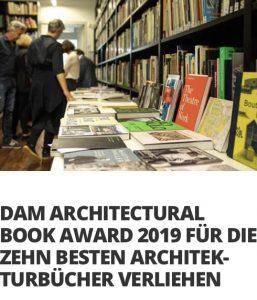
Since the establishment of the DAM Architectural Book Award in 2008, one hundred and ten books have been granted awards: books that would potentially make for a library of contemporary excellence in architecture. However, these celebrations of writing in architecture seem to spark little reactions, even less so controversies.
October is generally marked by the Frankfurt Book Fair, where the winners of one of the four grand prizes solely dedicated to architecture books are being presented. A jury selects the propositions based on criteria of form and content: “design, ideas, quality of materials and finish, level of innovation and respect of delays” (1). Strictly speaking a “honorary distinction”, awards granted by the German Museum of Architecture does not involve a financial reward, though, as stated by its organizers, these distinctions “arouse more and more reactions” (2) as they believe that, in this period of increasing competition of new mediums of communication, architecture books remain reliable reference material.
All books on architecture with an ISBN published between June 2018 and August 2019 were eligible to compete: works edited for advertisement purposes or online publications and journals were not considered. The books presented to the DAM must match to one of the following categories: building monograph, illustrated books, documentaries (contemporary) history, children’s book, landscape architecture, textbooks, materials science, urbanism, and, finally, “special subject” — without further detail.
When a book is granted an award, his carrier — the person from the publishing house in charge of its dossier — grants their approval for the presentation of the book at the DAM’s kiosk at the Frankfurt Book Fair as well as in many other book fairs across the world through the same organization. The carrier also authorizes the publication of excerpts — several spreads containing text and illustrations — on the DAM’s website. In order to expose the award-winning books at the Frankfurt Book Fair as well as on the fair’s collective German and international stands, between six and ten additional copies must be made available free of charge at the disposition of the DAM by its editors.
The jury of external experts of this 2019 edition was composed of six representative members of many disciplines and book trades: Hendrik Hellige (Frankfurt Book Fair), Micheal Kraus (M Books Verlag publishers), Friedrike von Rauch (photography), Florian Schülter (architect and member of the board of directors of the Society of the Friends of the DAM), Adeline Seidel (journalist) and David Voss (designer). The four internal jurors reinforce the museum’s say over the award: Peter Cachola Schmal (director of the DAM), Anette Becker (curator at the DAM), Oliver Elser (curator at the DAM), Christina Budde (curator at the DAM) — a total jury, internal and external, of an even effective of ten members, five of whom are tied to the German museum.
Around a hundred editors of architecture books responded to the call worldwide. In total, two hundred and twenty-seven propositions were reviewed to determine tenwinning works. In the press release issued in late September (3), rather than the name of the authors, those of the publishers and their associated cities were highlighted.
While much of the competition was international and open to English books, Swiss editors were the most represented (four of ten), followed by Germans editors (three of ten), Belgian editors (two of ten) and Russian editors (one of ten). Half of the books granted an award had an English title. The 2019 Library of Excellence Award of the DAM is thus made up of the following works:
- Architektur der 1950er bis 1970er Jahre im Ruhrgebiet. Als die Zukunft gebaut wurde / Kettler, Dortmund(Germany)
- Oil and urbanism / Park Books, Zürich (Switzerland)
- Bovenbouw Architectuur. Living the Exotic Everyday / Flanders Architecture Institute, Antwerpen (Belgium)
- Die Welt der Giedions. Sigfried Giedion und Carola Giedion-Welcker im Dialog / Scheidegger & Spiess, Zürich (Switezerland)
- Léon A Life of Architecture 1899-1990 / Flanders Architecture Institute, Antwerpen (Belgium)
- Lochergut – Ein Portrait / Quart Verlag, Luzern (Switzerland)
- Theodor & Otto Froebel. Gartenkultur in Zürich im 19. Jahrhundert / gta Verlag, Zürich (Switzerland)
- The Object of Zionism. The Architecture of Israel / Spector Books, Leipzig (Germany)
- Vom Baustoff zum Bauprodukt. Ausbaumaterialien in der Schweiz 1950-1970 / Hirmer Verlag, München(Germany)
- Veneč. Welcome to the Ideal / Gluschenkoizdat, Moskau (Russia)
Awards dedicated to architectural writing proliferate, as do literary awards. Other than the DAM architectural book awards, the famous Alice Davies Hitchcock Book Awards (1945 — anglophone) as well as the Prix du Livre de l’Académie d’Architecture (1996 — francophone) and the Grand Prix du Livre de la ville de Briey (1994 — francophone) confirm that we no longer only celebrate quality through buildings in architecture: writing is securing a choice place for itself. The momentum of this “economy of prestige” would correspond to the observations of James F. English, with one exception: the prizes dedicated to books on architecture do not seem to face these controversies and “cults of scandal” that reinforce the media coverage of literary awards (4).
Lucie Palombi
Notes:
- (1) http://www.dam-online.de (page consulted October 10th 2019)
- (2) See www.dam-online.de (page consulted October 10th 2019)
- (3) See www.dam-online.de (page consulted October 10th 2019)
- (4) English, James , The Economy of Prestige. Prizes, Awards and the Circulation of Cultural Value, Harvard University Press, 2005. p.192: « Every new prize is always already scandalous. The question is simply whether it will attract enough attention for this latent scandalousness to become manifest in the public sphere ».
Translated from French by Lucas Cormier-Affleck, October 23rd 2019.
